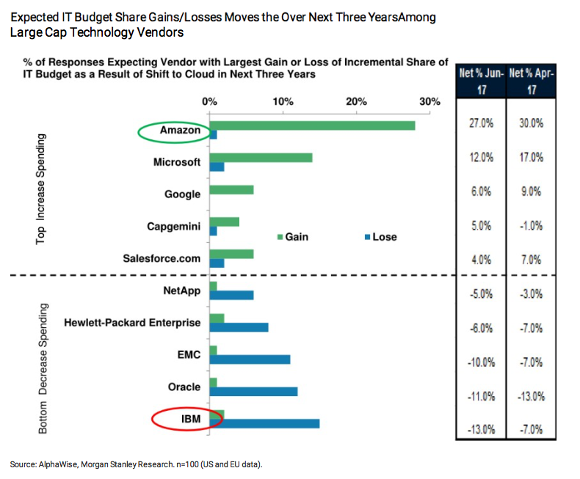
Cloud technology is the main theme of the week. Microsoft solidified themselves as the #2 cloud company with very strong earnings. Amazon is zoning in on health cloud and lured away a Box executive to make things happen. They also removed certain ownership language in their standard contracts that rubbed many clients the wrong way. Google is attempting to push quantum computing to cloud as industry insiders ponder if their strategy is working.
IBM’s 21st consecutive quarterly loss had news organizations and investors calling for IBM to make a change… any change at this point.
Acquisitions
- Sprint’s Chairman Has Engaged Warren Buffett About Investment
Sprint Corp. Chairman Masayoshi Son has engaged Warren Buffett and cable mogul John Malone in discussions about participating in a deal with the wireless company, people familiar with the situation say.
The contours of the deal the parties are discussing are unclear. The talks are at an early stage and may not result in an agreement, the people said, but one possibility would see Berkshire put more than $10 billion into a transaction.
- Uber Rival Grab in Talks for Up to $2 Billion from SoftBank, China’s Didi
Singapore-based GrabTaxi Holdings Pte is raising as much as $2 billion from Japan’s SoftBank Group Corp and Chinese ride-hailing company Didi Chuxing Technology Co., people familiar with the matter said.
The deal could be completed in the next few weeks and would value Grab, as it is known, at more than $5 billion—making it the region’s most valuable startup. Grab launched in 2012 and operates in 65 cities across seven countries.
Artificial Intelligence
- IBM’s AI can predict schizophrenia by looking at the brain’s blood flow
The research team first trained its neural network on a 95-member dataset of anonymized fMRI images from the Function Biomedical Informatics Research Network which included scans of both patients with schizophrenia and a healthy control group. These images illustrated the flow of blood through various parts of the brain as the patients completed a simple audio-based exercise. From this data, the neural network cobbled together a predictive model of the likelihood that a patient suffered from schizophrenia based on the blood flow. It was able to accurately discern between the control group and those with schizophrenia 74 percent of the time.
https://www.engadget.com/2017/07/20/ibms-ai-can-predict-schizophrenia-by-looking-at-the-brains-blo/
Cloud
- Amazon nabs a top Box exec in health as it goes after the medical industry
Missy Krasner, vice president and managing director of Box’s healthcare and life sciences group, is headed to the e-commerce company, according to two sources familiar with the matter. The sources, who asked not to be named because the hire hasn’t been announced, didn’t know exactly what role she’ll have.
Amazon is investing heavily in health across a number of different areas, and another source said Krasner has been talking to Amazon Web Services for several years about a potential move.
AWS, the cloud division, is bolstering its HIPAA-compliant offerings so that health-care providers and insurers can store and move customer data. Customers include Bristol-Myers Squibb, Siemens and Orion Health.
http://www.cnbc.com/2017/07/20/amazon-hires-box-vp-missy-krasner-to-beef-up-health-division.html

- Google wants to sell quantum computing in the cloud
Whether or not you believe Google has honest-to-goodness quantum computers, the bigger problem is their limited access: they’re largely off-limits outside of the company itself. That could change sooner than you think, though. Bloomberg sources understand that Google is gearing up toward using its quantum systems in a “faster, more powerful” computing service than it offers today. It recently started offering access to researchers in order to spur development of tools and apps (including through an open source Project Q initiative), and there’s a new lab it describes as an “embryonic quantum data center.” It’s looking at the practical realities of quantum computing, in other words.
https://www.engadget.com/2017/07/17/google-puts-quantum-computers-to-work-in-cloud/
- Is Google’s Cloud Strategy Working?
Alphabet doesn’t break out its cloud sales, but it believes it could beat Amazon to become the world’s largest cloud infrastructure vendor in the next five years. Amazon generated $3.7 billion in revenue from its cloud division, AWS (Amazon Web Services), in 2Q17, which represented a 42.0% YoY (year-over-year) rise.
Alphabet’s cloud business will be on the radar of many investors as it reports 2Q17 earnings, mainly due to Google’s comments about its cloud strategy. Google earlier this year suggested that it doesn’t see itself joining rivals Amazon, Microsoft, and Oracle in cloud computing pricing wars.
Instead, Google wants to compete on the basis of service quality and portray itself as the go-place for cloud services related to data analytics and artificial intelligence.
http://marketrealist.com/2017/07/is-googles-cloud-strategy-working/
- Amazon Cloud Service Drops Controversial Clause
With competition heating up in the cloud computing arena, Amazon.com Inc. is removing a clause from its Amazon Web Services contracts that irked customers worried about their intellectual property (IP).
Based on an updated version of the AWS customer agreement, the ecommerce giant has remove the non-asset clause from the contract that prevented customers from suing the company over patent infringement. With a tons of companies using AWS for computing and data storage, many were concerned that IP could end up in the hands of Amazon.
http://www.investopedia.com/news/amazon-cloud-service-drops-controversial-clause/

- Microsoft Profit Jumps, Fueled by Cloud Computing
Microsoft doesn’t disclose revenue figures for its Azure and Office 365 businesses, but it said Azure revenue jumped 97% and Office 365 revenue rose 43%.
Overall, Microsoft posted $6.51 billion in fourth-quarter net income, or 83 cents a share, compared with a profit of $3.12 billion, or 39 cents a share, a year ago. Excluding the impact of revenue deferrals and other items, adjusted earnings climbed to 98 cents from 69 cents a year earlier.
https://www.wsj.com/articles/cloud-computing-helps-power-microsoft-earnings-1500583095
Datacenter
- Michael Dell Says Public Cloud Is Important But It’s Not Everything
“There’s a boomerang of companies moving to public cloud,” Dell said. “We’re not against it, but it’s not the right place to put all workloads.”
For 90% of a given company’s predictable computing tasks, running them in-house or in a co-location center, costs less than public cloud, Dell said. A co-location center is a data center used by many businesses, each of which controls their own hardware and software.
“AWS gets expensive when you scale it up,” Dell said. (That’s a contention that Amazon would likely contest.)
Software/SaaS
- Rimini Street: Dispute with Oracle is contract law, not copyright
The smaller company accepted some of the charges against it, saying it will pay $35.6m for “innocently infringing the software”, but appealed against the rest following the October 2016 judgment.
Without being able to do this, Rimini Street is prevented from carrying out its responsibilities to its own clients, Perry added.
He argued that Oracle had surrendered its exclusive rights to copying, and that Rimini had permission to copy the software – instead the issue was with the environment that it created and how that environment was used, and on which server it lived.
“Cross-use and hosting are contract law,” Perry said. “Those are licence disputes… and ought to be resolved as matter of contract law and not copyright law.”
https://www.theregister.co.uk/2017/07/14/oracle_vs_rimini_street_court_latest/
Other
- IBM Revenue Decline Continues to Pressure Bottom Line
The 4.7% drop in second-quarter revenue, to $19.3 billion, marked the 21st consecutive quarter of declining sales at IBM. Profit margins also narrowed across all business units, including the divisions for its main cloud computing and Watson-artificial intelligence operations—two areas Ms. Rometty is counting on to propel the company’s turnaround. Profit fell 6.9% from a year earlier.
Earnings results exceeded analysts’ expectations. Still, revenue came in below forecasts, and shares in Big Blue slid more than 3% after-hours Tuesday, extending a roughly 8% drop this year through Tuesday’s close. In contrast, the S&P 500’s has gained nearly 9% during the same period.
https://www.wsj.com/articles/ibm-revenue-decline-continues-to-pressure-bottom-line-1500411024
- To Save IBM, Rometty Needs To Go Big Or Go Home
Rometty should aggressively rebrand IBM by simply naming it after the one thing in which IBM remains a market leader – Watson. All efforts in the cloud should be geared towards not just acting as a service provider but differentiating IBM by tailoring Watson’s services to the given client’s data so it can augment their decision-making. While they’re at it they can rename their cloud effort Watson Cloud.
https://www.forbes.com/sites/ryanwibberley/2017/07/19/to-save-ibm-rometty-needs-to-go-big-or-go-home/#2479fd827ac0
Cramer: IBM is just another company that has been ‘Amazoned’Regarding IBM’s growth, Cramer said a lot of the initiatives the company is doing have not “kicked in yet, so the stock has not kicked in yet.” He added, “IBM is really burdened by the old business. And the new business — they’re up against these amazing companies.”
http://www.cnbc.com/2017/07/19/cramer-ibm-is-just-another-company-that-has-been-amazoned.html
Photo: Robson Hatsukami Morgan


















